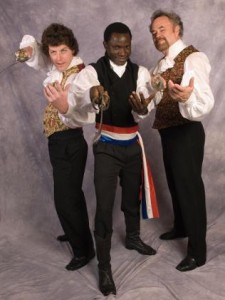 Presented by Independent Theatre
Presented by Independent Theatre
Reviewed Fri 23rd July 2010
http://www.independenttheatre.org.au
Venue: Odeon Theatre, Norwood
Season: Sat 24th July 7:30, Sun 25th 4pm, Tues 27th 6:30, Wed 28th to Sat 31st 7:30, Sat 31st 2pm
Duration: 2hrs 55min incl 2 intervals
Tickets: adult $33.30/conc $28.30
Bookings: BASS 131 241 or http://www.bass.net.au
The central character in this play is Alexandre Dumas, père, born Dumas Davy de la Pailleterie (24 July 1802 – 5 December 1870), who wrote many well-known novels including The Three Musketeers, The Count of Monte Cristo and The Man in the Iron Mask. His illegitimate son, Alexandre Dumas, fils (27 July 1824 – 27 November 1895), is best known for his novel The Lady of the Camellias and the play, Camille, that he adapted from it, although he wrote a great deal more.
Dumas senior’s father was General Thomas-Alexandre Davy de la Pailleterie (25 March 1762 – 6 February 1806), known as Thomas-Alexandre Dumas, a member of Napoleon’s army. He was, in turn, the son of a minor French aristocrat, the Marquis Alexandre-Antoine Davy de la Pailleterie, and an Afro-Haitian woman, Marie-Césette Dumas. The name Dumas came from du Mas, meaning ‘of the farm’, reflecting her status as a farm manager.
The lasting influence of the late grandfather on both father and son, their differing perspectives on his story and the effect that this has on their relationship, is the core of this play. Whilst the father reveres the General as a hero of France, the son sees him as a traitor and coward. There is also a conflict between them over their very different approaches to life and personal ethics.
Dumas, père, was a womaniser, reported to have fathered around 500 illegitimate children, a braggart, an egotist and extremely self-centred. When we discover him, he is attempting to seduce Ida Ferrier, an actress, on the pretext of ‘interviewing’ her for the lead in his next play as a prelude to introducing her to George Sand.
George Sand and Victor Hugo also appear, with Sand taking a liking to the actress, Ida Ferrier, and Hugo trying to persuade Dumas to cast his ‘niece’, Mademoiselle Mars, in the lead role, for similarly sexually gratifying reasons. Dumas, hoping to follow Hugo in being inducted into L’Académie Francaise, agrees to allow his ‘niece’ to play the lead in exchange for Hugo’s efforts to further his induction but, in order to convince Sand, who is funding the play, he must write her a play about Napoleon, whom he hates for his mistreatment of the General.
Running at almost three hours this is a very long production, especially in a time where audiences are becoming accustomed to one act plays of only 60 to 90 minutes length. A newly written three act play is a rarity. The first act is an expositional section, introducing the main characters, establishing their personas and relationships and setting the period and tone of the piece. Adelaide audiences are, by and large, intelligent and perceptive enough to take this information into account in far less than the hour or so that this act took. It was not only long and over-written but, since it did little more than set the scene for the two remaining acts, it was also slow, in spite of the fine acting and director, Rob Croser’s, best efforts to keep up the pace.. It could be easily cut considerably and merged with the second act, where the action really begins.
Croser has cast this production very well, with a blend of regulars and newer faces. In the lead role of Dumas, père, David Roach commands the stage, strutting, posturing and pontificating as Dumas attempts to get his own way in everything. There is a wealth of light and shade in Roach’s performance that allows us to see the insecurities through the blustering, as Dumas faces the events happening around him over which he is quickly losing control.
Peta Long, ideally cast in the role of Ida Ferrier, is as bright as a whole boxful of buttons, bounding with energy as she leads Dumas on a merry dance, keeping him at arms length until she gets what she wants, before giving him the chance to get what he wants from her.
Shedrick Yarkpai has a double role, as the manservant to Dumas, père, and also as his father, the General who appears both in flash-back and, to Dumas, fils, in spirit through his delirium, following an infected sword cut. Yarkpai neatly highlights the similarities between the two, whilst maintaining two distinct characterisations.
Peter Cortissos is Dumas, fils, and gives a fine performance as a man suffering from an infection, high temperatures, delusions and still trying to keep the family name intact, in spite of his father’s philandering and excesses.
Matt Shannon looks remarkably like Napoleon Bonaparte and gives a strong rendition of the role. Lyn Wilson plays George Sand with a relish, making the most of all of the possibilities in the part. Nicholas Ely provides a fair degree of comic relief as Félix Harel. Tom Carney takes the role of Victor Hugo, giving a measured performance as the outwardly staid and sober member of society, but who hides inner passions for his ‘niece’.
Kate Wyatt plays both the wife of General Dumas, giving a nicely complex performance mingling anger at his treatment by Napoleon with grief at his illness and, as the actress, Mlle. Mars, providing a distinct contrast as the rather energetic, enthusiastic, but dim girl who fails to realise that George Sand is, in fact, a woman dressing as a man.
David Roach’s spacious set, dominated by a massive fireplace, leaves plenty of room for chases and swordfights, and for ease of movement for the ladies in the wide skirts of their marvellous costumes. This is another excellent offering from Independent with Croser’s usual attention to detail and understanding of the importance of careful casting in evidence.
Reviewed by Barry Lenny, Arts Editor Glam Adelaide.




















